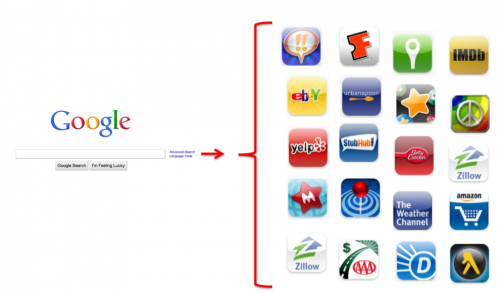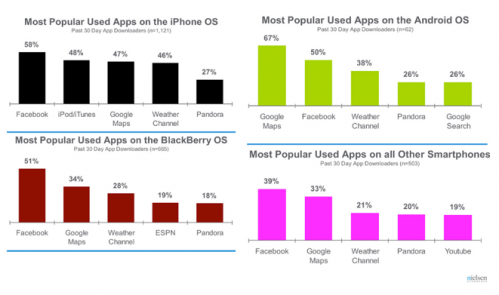Mobile Apps: Search By Another Name
Responding to Apple CEO Steve Jobs’ declaration that on mobile devices “search hasn’t happened,” we’ve now written several times about how mobile apps of various sorts are essentially search by another name. Just to refresh your memory, here’s Jobs making that statement in April of this year: [youtube]https://www.youtube.com/watch?v=YuQWPGTBVE4&feature=player_embedded[/youtube] The specific app he references (in case […]
Responding to Apple CEO Steve Jobs’ declaration that on mobile devices “search hasn’t happened,” we’ve now written several times about how mobile apps of various sorts are essentially search by another name. Just to refresh your memory, here’s Jobs making that statement in April of this year:
[youtube]https://www.youtube.com/watch?v=YuQWPGTBVE4&feature=player_embedded[/youtube]
The specific app he references (in case you missed it) is Yelp. He mentioned Yelp again in his recent interview at the D8 event in discussing the same issue of search on mobile devices:
Steve: We discovered something — people are going into apps. They’re not just going onto to websites. And people love apps. This is an entirely new thing — they aren’t using search, they’re using apps like Yelp.
Last week in conjunction with the release of the fifth version of its iPhone app Yelp exposed some striking data about the role that mobile now plays in its traffic:
On average, 27% of all Yelp searches come from our iPhone App. That number dips during the week when Yelp.com traffic surges. Then on the weekend, it moves up again as people pull out their Yelp mobile apps when they’re on the go – a trend we’ve already been seeing for quite some time!
(Emphasis added.)
Yelp can be variously described as: a) a city guide, b) local restaurant and shopping vertical or c) a local search engine. It really doesn’t matter what it’s called, people input queries in a search field to find information — although there are other ways to discover information and recommendations on Yelp.com or its mobile app.
Not all mobile apps of course can be used as substitutes for search engines or have search functionality. But there are quite a few of them that are used in the same way one might use now Google on the PC to navigate to content or otherwise obtain information. And of course both Google and Bing offer iPhone apps that are explicitly search engines.
What Jobs is really saying when he says “search hasn’t happened” or “isn’t happening” on mobile devices is that traditional search (and Google in particular) isn’t the gateway to mobile content the same way it is on the PC internet. Instead, “search” as it has moved into a mobile context is a little like Humpty Dumpty — broken into a million pieces called apps:
One of the most popular apps on the iPhone and other smartphone platforms according to Nielsen is Google Maps, which we might describe as a “local search engine”:
Beyond all the specific apps available, people are in fact using the browser and its search box in the old fashioned way to find content on the mobile internet. According to comScore, 31 percent of the US mobile audience used a browser to access internet content in April:
In addition, according to comScore, the number of people who used a mobile browser exceeds the number of people who used apps (see above). If we were to focus exclusively on the smartphone segment (now 23% of US mobile handsets according to Nielsen) the data would be somewhat different.
We can also see from the most recently published Opera data that the most popular site accessed through its iPhone Opera Mini browser is . . . Google:
So people on the iPhone are searching the mobile web with Google.
The larger point is that on the iPhone and Android, to a somewhat lesser degree, “search” has taken many and varied forms and isn’t all about Google. Jobs is technically correct that “people aren’t searching on a mobile device like they do on the deskop” — “like they do on the desktop.” But they’re still searching; it’s just that mobile search and PC search aren’t entirely the same.
The “so what?” of all this for search marketers is that while mobile paid search and “mobile SEO” are important tools, other strategies are now also required to reach consumers engaged in “directional lookups” on their mobile devices.
We’ll be showcasing both mobile search tactics and the role of apps (in an LBS context) at SMX Advanced next week in two sessions that I’m moderating: “Ads On The Move: Mobile Paid Search” and “Location Services: The New Local Search?” Both are on Wednesday.
Contributing authors are invited to create content for Search Engine Land and are chosen for their expertise and contribution to the search community. Our contributors work under the oversight of the editorial staff and contributions are checked for quality and relevance to our readers. The opinions they express are their own.
Related stories




